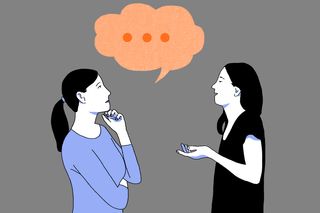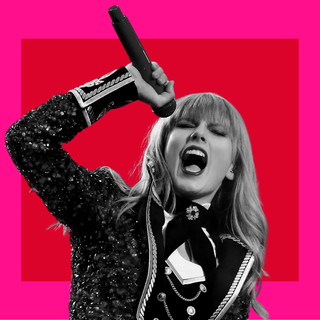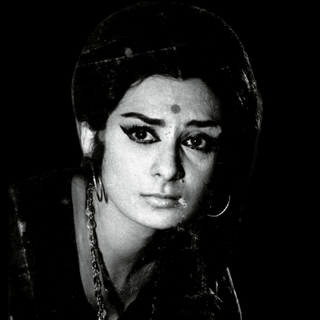
The Pressure To Always Say the ‘Right’ Thing Affects the Way We Communicate
When we internally script conversations, communication becomes confusing at best, and performative at worst.

In the age of social media, it sometimes feels like we’ve signed up for a reality show to find the most “woke” person in all of humankind. In this Bigg Boss-esque setting where our words are constantly being monitored, it seems as if the smallest of missteps will lead to an elimination a.k.a. “being canceled.”
So often, people become so preoccupied with figuring out the “right” things to say that they forget to actually listen to the people around them. Although this can seem like textbook performative behavior, it is often just a manifestation of social pressure and fear of backlash.
Human beings, in general, tend to have a fear of saying the “wrong” thing — a simple Google search will turn up scores of articles teaching people how to master the art of always saying the “right” thing. But social media has, perhaps, exacerbated the anxiety that comes with it.
Manvi Sharma, a psychotherapist, explains the fear of “being watched all the time,” especially in the age of social media, is one of the contributors to the stress. Commenting on her own fears of accidentally saying the wrong thing, or being perceived as politically incorrect, she says the internet is “very unforgiving” of the “digital footprint people leave.” Even though she hasn’t been at the receiving end of such “judgments,” she explains that witnessing others dealing with it can make the internet seem like a “scary place.”
It’s almost like the fear of backlash has led people to memorize scripts that don’t convey what they mean — making their communication seem confusing at best and performative at worst.
Speaking of an ex, Akira*, 27 says: “She knew that I am on the autism spectrum, and I got agitated whenever we used to fight. So, I remember after a fight she was so careful in weighing her words that she didn’t even listen to what I had to say.”
Related on The Swaddle:
The ‘Spotlight Effect’ Is When You Think People Are Noticing Your Flaws More Than They Really Are
Anjali*, 25 mentions a friend of her’s, who opened up to her about their eating disorder. “I was so focused on saying the right thing [to my friend] that I stopped listening to the story midway — trying to form a response in my head,” she says.
At the same time, the pressure to say the “right” thing can also translate into pressure to just, well, parrot back scripts at people.
A colleague talks about how, whenever her friends expressed negative feelings about their bodies, she would tell them it’s unhelpful to indulge in “negative self-talk” or “body shame” themselves. “But, eventually, I realized that although these were the social-media-approved, ‘woke’ scripts for addressing body dysmorphia, it wasn’t really helping my friends in that moment. In my attempt to say the ‘right’ thing, I wasn’t really listening,” she says. “Telling someone they’re not feeling things the ‘right’ way most certainly doesn’t help no matter how ‘woke’ our responses might be.”
Anjali says, “When big things are being communicated to me I just want to sit in silence and process it before saying anything. But that is often construed as ‘I told her so much and she didn’t say anything.’”
Especially when it comes to sensitive discussions surrounding topics like eating disorders or body dysmorphia, for instance, individual experiences can vary so widely that no one “politically correct” script can help people across the board. To translate our intent to help into action, it becomes important to focus on understanding what the person speaking to us may be going through. Listening, and processing information we hear, are both integral facets of communication between people. By preventing them, the pressure to “say” the right thing can directly and adversely affect communication.
The “right” thing to say can also vary from one setting to another. If there’s pressure to appear “woke” on social media, many feel pressured to be the “aadarsh aulaad (ideal child)” at home. Vee says growing up in a dysfunctional family and dealing with neglect as a child is, to some extent, responsible for the pressure she feels to say the “right” thing. Indian parents and relatives often penalize people — especially children and adolescents — for expressing thoughts or opinions antithetical to their own.
In addition, gendered expectations, too, have played a role in causing her to focus “too much” on saying the “right” thing, Vidushi, 26 notes, explaining that “especially as a woman, I’ve been told to mind my language [and] think before I speak… I’m labeled as ‘ladaaku [or, bellicose],’ and a “rebel without a cause… or dismissed as ‘crazy’ or ‘too emotional.'”
M., 28, says, “This pressure is definitely making me more socially anxious day by day.”
Related on The Swaddle:
Cancel Culture Cannot Be The Knee Jerk Reaction To Mildy Controversial Gaffes
The social pressure to adhere to the mindset of the majority can also hurt the spirit of discourse and open communication. Tanveer, 27 says the pressure forces him to either “adhere to either certain topics of conversation, or submit to a point of view that’s more agreeable… [But] I think discussions can be more nuanced.”
Sharma adds that it’s like “there’s no coming back [from having said a “not right” thing]… The environment seems very hostile. There’s no scope of learning, or of growing as an individual.” She mentions that as human beings, we’re evolving constantly, but people often forget that part of being human. According to her, the pressure to say the “right” thing also restricts authenticity and leaves very little room for actual conversation.
However, it is also pertinent to note that freedom of expression is often used as an excuse by dominant social groups to “debate” actual lived experiences of marginalized communities. There is certainly a difference between freely exchanging ideas with friends in interpersonal settings and using freedom of expression as an excuse to hurt sentiments in public. And in either case, honesty — rather than an urge to “win” a debate, or have our prejudices validated — must serve as the guiding force.
Maybe, here, the social pressure to not “offend” can be helpful in facilitating a mutually respectful exchange of ideas. “Sometimes, even if I disagree with something but I don’t know why — I generally don’t comment,” Tanveer says. “I say something when I have thought the thing out, researched it, and understood what I think and feel.” While Tanveer’s guiding force is also, basically, honesty, the social pressure is, perhaps, something that can force people to be as honest as possible.
Open discussions can serve as a channel for exchanging ideas, resolving disputes, and, well, evolving as people. Without the pressure of “saying” the right thing, one can focus their attention on listening and processing — not only so the quality of the communication improves, but also so that, as a result, they are in a position to “do” the right thing if the situation demands it.
*Name concealed to protect identity.
Devrupa Rakshit is an Associate Editor at The Swaddle. She is a lawyer by education, a poet by accident, a painter by shaukh, and autistic by birth. You can find her on Instagram @devruparakshit.
Related


By Re‑Recording Her Albums, Taylor Swift Subverts the Crazy Ex‑Girlfriend Narrative
